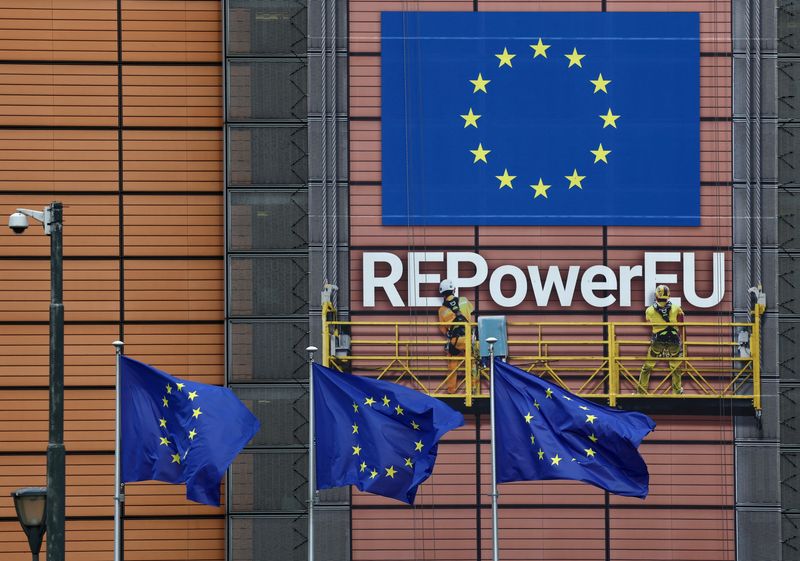BRUSSELS (Reuters) - The European Commission published on Wednesday its report on progress made by candidates to become members of the European Union on the road to fulfilling all the necessary criteria.
Accession talks can take a decade or longer.
Below is a list of countries hoping to one day become members of the EU, and their formal status:
COUNTRIES WITH CANDIDATE COUNTRY STATUS
UKRAINE (candidate since 2022):
Ukraine applied for EU membership several days after it was invaded by Russia in February 2022, and was granted candidate status in June that year. In December 2023, EU leaders decided to start accession talks with Ukraine and membership negotiations opened in June 2024.
EU-Ukraine relations go back almost 30 years - the EU signed a Partnership and Cooperation Agreement with Ukraine in 1994 and it entered into force in 1998.
In 2004 Ukraine became an EU priority partner after the "Orange Revolution" against electoral fraud and corruption signalled it was on a path towards integration with the EU.
In 2014, pro-Russian President Viktor Yanukovych refused to sign an association and trade agreement with the EU, sparking the popular Maidan Revolution, which was followed by Russia's annexation of Crimea. The association and trade deal with the EU came into force in 2017.
Ukraine has stepped up its quest for an EU membership path since Russia's full-scale invasion in February 2022.
MOLDOVA (candidate since June 2022):
The EU has had an association deal with Moldova, including a deep and comprehensive free trade area, since 2016. The country applied for EU membership in March 2022. To progress to the start of accession talks, the European Commission asked Moldova to reform its judiciary, curb graft and organised crime, get rid of oligarchs, reform public administration and finances, involve civil society and boost the protection of human rights. EU leaders decided to start accession talks with Moldova in December 2023 and membership negotiations started in June 2024.
TURKEY (candidate since 1999):
While still officially a candidate country, Turkey saw its accession talks freeze many years ago, largely over human rights and governance concerns. EU entry for Turkey, a country of 85 million people, is currently not part of the political debate. It applied for EU membership in April 1987 and become a candidate country in December 1999. Membership negotiations opened in October 2005.
NORTH MACEDONIA (candidate since 2005):
It has been on a path to the EU since 2003 and has had a Stabilisation and Association Agreement - an individually tailored framework for relations - since 2004. It applied for EU membership in March 2004. It became a candidate country in December 2005 and membership negotiations opened in March 2022 after it changed its name from Macedonia to North Macedonia to satisfy Greek sensitivities. But talks have yet to begin in earnest, due to objections from neighbouring Bulgaria over history and language.
MONTENEGRO (candidate since 2010):
The small Adriatic country applied for EU membership in December 2008. Accession talks began in June 2012 and since then 33 out of the total of 35 chapters of negotiations - areas in which the candidate needs to emulate EU laws - have been opened and three of those have been provisionally completed.
SERBIA (candidate since 2010):
The largest West Balkan nation was identified as a potential candidate in 2003 and has had a Stabilisation and Association Agreement with the EU since 2013.
It applied for EU membership in December 2008 and become a candidate country in December 2010. Accession talks began in 2012 and 22 out of a total of 35 chapters of negotiations have been opened and two completed.
ALBANIA (candidate since June 2014):
Another West Balkan country, it was identified as a potential candidate in 2003 and applied in April 2009 to become an EU member. Albania obtained candidate status in 2014.
Accession talks formally began in July 2022 after Albania met conditions on changes to the judiciary, fighting corruption and organised crime, intelligence services and public administration. But its talks have yet to begin in earnest as the EU has coupled Albania's membership bid to that of North Macedonia, effectively meaning both are held up by Bulgaria.
BOSNIA AND HERZEGOVINA (candidate since December 2022):
Bosnia was identified as a potential candidate in 2003 and has had a Stabilisation and Association Agreement with the EU since 2015. It applied for EU membership in February 2016.
To start accession talks Bosnia must implement 14 priorities set by the Commission in 2019 which focus on democracy and functionality of the state, rule of law, fundamental rights and public administration reform.
In December 2023, EU leaders decided they will open accession negotiations with Bosnia and Herzegovina once the necessary degree of compliance with the membership criteria is reached and will check that in March 2024.
GEORGIA (candidate since December 2023):
Georgia applied for EU membership in March 2022. EU governments granted Georgia candidate status in December 2023. Since 2016, the EU and Georgia have had an association deal that covers trade.
AWAITING CANDIDATE COUNTRY STATUS

KOSOVO (applied for EU membership in December 2022):
Brussels has held out the prospect of an EU perspective for Kosovo since 2005, even before the country's declaration of independence from Serbia in 2008. But not all EU countries recognise Kosovo as an independent state. Since 2016, the EU has had a Stabilisation and Association Agreement with Kosovo that serves as a basis for its accession path.